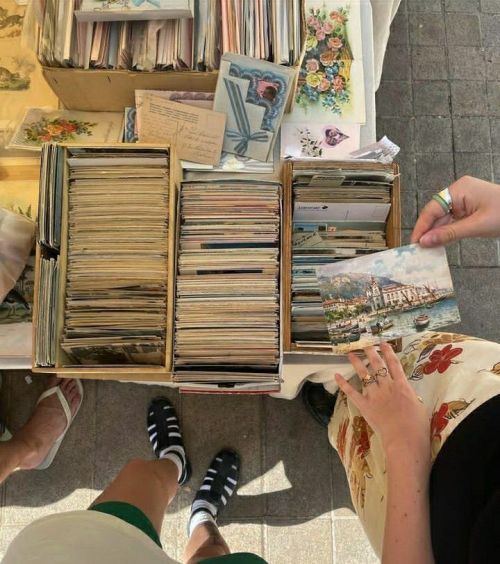I Have A Question: Why Do You Keep Sabotaging Yourself? Why Is It That As Soon As You Think Something
i have a question: why do you keep sabotaging yourself? why is it that as soon as you think something is just out of your reach you do everything you can to get in your own way? why is it that as soon as things seem to be going right, you plant your feet and sit on the ground with your legs crossed?
you're not fucking lucky. you worked for it, you sweated, and you cried, and you sacrificed so much to reach the level of knowledge and skill you have now.
have you worked so hard only to say "how lucky"? no, damn it, i won't let you. you may not be a genius, you may not be the best in the world, but do you fucking think anyone could do what you did? do you think anyone could get to where you are? do you believe that anyone has the possibilities that you have?
put this in your head, you are not unexpressed potential, you are exceptional and with your hard work you can achieve unimaginable things. stop wasting your dreams just because they seem too big for the drawer.
edit : in italian we say "dream in the drawer" when we refer to a hope that is unlikely to come true, but not impossible.
ex. my dream in the drawer is to become a famous singer all over the world
(just in case you didn't understand the last sentence)
-
 bjalexdg liked this · 9 months ago
bjalexdg liked this · 9 months ago -
 0lifegrips liked this · 9 months ago
0lifegrips liked this · 9 months ago -
 violetsky9 liked this · 10 months ago
violetsky9 liked this · 10 months ago -
 newtonartemisfidolurchscamander liked this · 10 months ago
newtonartemisfidolurchscamander liked this · 10 months ago -
 d1eam liked this · 10 months ago
d1eam liked this · 10 months ago -
 passionateleo67 liked this · 10 months ago
passionateleo67 liked this · 10 months ago -
 litnightsky liked this · 10 months ago
litnightsky liked this · 10 months ago -
 lisol liked this · 10 months ago
lisol liked this · 10 months ago -
 goodpersonwannabe liked this · 10 months ago
goodpersonwannabe liked this · 10 months ago -
 vampire-slayer127 liked this · 10 months ago
vampire-slayer127 liked this · 10 months ago -
 nanamigirl4ever liked this · 10 months ago
nanamigirl4ever liked this · 10 months ago -
 eiieiioo reblogged this · 11 months ago
eiieiioo reblogged this · 11 months ago -
 eiieiioo liked this · 11 months ago
eiieiioo liked this · 11 months ago -
 imbatman33 liked this · 11 months ago
imbatman33 liked this · 11 months ago -
 silvue liked this · 11 months ago
silvue liked this · 11 months ago -
 rogues--gallery liked this · 11 months ago
rogues--gallery liked this · 11 months ago -
 txtmyloves liked this · 11 months ago
txtmyloves liked this · 11 months ago -
 rainbowprocrastinationgalaxy reblogged this · 11 months ago
rainbowprocrastinationgalaxy reblogged this · 11 months ago -
 rainbowprocrastinationgalaxy liked this · 11 months ago
rainbowprocrastinationgalaxy liked this · 11 months ago -
 thesweetheartdiaries reblogged this · 11 months ago
thesweetheartdiaries reblogged this · 11 months ago -
 cromwelll liked this · 11 months ago
cromwelll liked this · 11 months ago -
 bananasaging liked this · 11 months ago
bananasaging liked this · 11 months ago -
 diiaangelo liked this · 11 months ago
diiaangelo liked this · 11 months ago -
 sassyeaglepaper liked this · 11 months ago
sassyeaglepaper liked this · 11 months ago -
 bookalicent liked this · 11 months ago
bookalicent liked this · 11 months ago -
 personaldiary liked this · 11 months ago
personaldiary liked this · 11 months ago -
 how-we-get-by liked this · 11 months ago
how-we-get-by liked this · 11 months ago -
 marvelblog123 liked this · 11 months ago
marvelblog123 liked this · 11 months ago -
 golden-romance liked this · 1 year ago
golden-romance liked this · 1 year ago -
 xemoxericax liked this · 1 year ago
xemoxericax liked this · 1 year ago -
 violette-blr liked this · 1 year ago
violette-blr liked this · 1 year ago -
 choco-n-study liked this · 1 year ago
choco-n-study liked this · 1 year ago -
 caffeinatedcadaver liked this · 1 year ago
caffeinatedcadaver liked this · 1 year ago -
 sthasian liked this · 1 year ago
sthasian liked this · 1 year ago -
 unicarol12 liked this · 1 year ago
unicarol12 liked this · 1 year ago -
 blooms-ur-doom liked this · 1 year ago
blooms-ur-doom liked this · 1 year ago -
 pistachiophobia liked this · 1 year ago
pistachiophobia liked this · 1 year ago -
 cherycola liked this · 1 year ago
cherycola liked this · 1 year ago -
 angelsstudies liked this · 1 year ago
angelsstudies liked this · 1 year ago -
 anonannenome liked this · 1 year ago
anonannenome liked this · 1 year ago -
 tempusssfugit liked this · 1 year ago
tempusssfugit liked this · 1 year ago -
 bustedsquid liked this · 1 year ago
bustedsquid liked this · 1 year ago -
 sogentleandsohonest liked this · 1 year ago
sogentleandsohonest liked this · 1 year ago -
 bebomeinbebo liked this · 1 year ago
bebomeinbebo liked this · 1 year ago -
 chronicdeath reblogged this · 1 year ago
chronicdeath reblogged this · 1 year ago -
 u4219574 liked this · 1 year ago
u4219574 liked this · 1 year ago -
 misti31 liked this · 1 year ago
misti31 liked this · 1 year ago
More Posts from Bmaf-luml


organization 101
organization is about how we gather stimuli in our environment to complete tasks quickly and more effectively. it's about arranging our surroundings, providing order, and structuring items and activities around us.
this topic can be applied in so many instances - including physical spaces, digital files, schedules, and mental clarity.
staying organized offers several benefits:
★ when you're organized, you waste less time searching for things or figuring out what to do next. this efficiency leads to increased productivity
★ clutter and chaos can contribute to stress. an organized environment promotes a sense of calm and control.
★ organization helps you allocate time effectively. you can prioritize tasks and allocate resources efficiently.
★ a clutter-free workspace (or living space) allows you to concentrate better on the task at hand.
★ organized spaces encourage healthier habits, such as regular exercise, balanced meals, and adequate rest.
but how can you stay organized?
★ start with one area of focus (e.g. closet, desk, documents, ...) and gradually expand. focusing on one area allows you to see tangible progress, and as you declutter or organize, you'll build momentum to tackle other spaces.
trying to organize everything at once can be overwhelming. by narrowing your focus, you can prevent feeling swamped. concentrating on a specific area also allows you to learn effective strategies,, which you can apply to other parts of your life!
★ keep a to-do list. you can use a planner or digital tools to track tasks - and prioritize and sort tasks by urgency. write things down promptly to avoid forgetting them.
by freeing your mind from trying to remember all of your tasks, this mental offloading allows you to focus on the present moment. you can also assign urgency and importance, ensuring you will tackle what matters most.
★ give everything a home. clutter happens when items lack designated spaces. organize your physical and digital spaces intentionally.
★ once organized, maintain order consistently by building habits and systems. regularly review and adjust your systems when needed.
maintaining daily habits can significantly contribute to staying organized.
digital files
personally, the biggest issue i have with organization is building (and maintaining) a good system for digital files. it is crucial for me to learn how to organize these well, however, as a digital creator.
here is the process:
★ create a folder structure,, and design a clear hierarchy of folders that reflect your workflow. organize files logically based on projects, departments, dates, or file types.
at the moment i sort my files as content home < links, content plan, instagram, pinterest, tumblr, youtube < scheduling, post ideas
however, sometimes i find myself with documents that don't fit any of these sections. my plan for the future is to reorganize this to be the most effective it can.
★ use descriptive file names,, and name files clearly and concisely. include relevant keywords to make searching easier
★ consider using tags to categorize files across multiple dimensions. tags enhance searchability and allow flexible organization.
this is something that i am looking to employ!
★ utilize cloud services like google drive or dropbox for easy access from anywhere.
i will forever be a notion girl,, even though it is not quite a cloud service, it allows me a similar experience.
★ make decluttering a routine. delete duplicate or unnecessary files.
★ pin essential folders to your sidebar for quick access.
physical decluttering
writing this, i was reminded of the (horrid) bedrotting trend, especially those videos where people would show their rooms with shit everywhere and mould growing on stuff. i'm aware that some people find it super hard to maintain organization or declutter - hoarding is a very real issue.
the benefits of staying organized were previously mentioned, but decluttering specifically has its own little set of positives. this includes reduced stress, improved focus, enhanced productivity, and more positive overall wellbeing.
here are some essential tips if you are struggling to get started:
choose a small area or category to begin decluttering. set a timer (15-30 minutes) and sort items in that area into 'keep', 'donate', 'trash', or 'unsure' piles.
you could also attempt a room-by-room approach, by tackling one room at a time. focus on completing each room fully before moving on to the next.
try to organize your belongings into categories (keep, donate, sell, discard) to make decisions easier.
remember - progress comes from consistent effort, and small steps lead to a clutter-free space.
further reading
i hope today's post was helpful!
as for further reading, check out these sites: ★ How to Declutter Your Home: 6 Best Room-by-Room Methods (thespruce.com) ★ First Steps to Decluttering - Understanding the Clutter - Being Minimalist ★ Productivity, Organization & Personal-Development | 101 Planners ★ Executive Functioning Skills 101: Organization | Life Skills Advocate ★ How to Be Organized - 10+ Habits - Organized 31 ★ How to Be More Organized & Productive | 10 Habits for Life Organization (youtube.com) ★ How to Be More Organized (verywellmind.com) ★ How to Organize Your Digital Files | Reviews by Wirecutter (nytimes.com) ★ Master How to Organize Digital File Management (riverfy.com)
❤️ nene
image source: pinterest






















BANGTAN through the years 💜 HAPPY 10 YEARS BTS, FUTURE'S GONNA BE OKAY! ♡ I can’t wait to spend another 10 years with you.

hello all! i have written quite a few research papers during my time in university, and these are some of the tips and tricks i’ve used while writing! (disclaimer: these are from the perspective of a history and spanish major so the process may be different for other majors and of course everyone is different! this is just what helps me)
1. spend time at the library
this is the most important tip in this post, hence its spot as number 1. not only is it great to spend time writing in the library to help you focus, but there are countless resources at your university’s library that will help you write the paper. depending on your university, you may have archives, an extensive array of books on the subject, and staff members specifically hired to help students do research. take advantage of these resources!
2. write an outline
having an outline is immensely helpful while writing a research paper. it helps you organize your thoughts and write more cohesively, especially when the paper is 8+ pages long. another important part of outlines is coming up with a clear thesis before you start writing so research is guided by a main point.
3. go to your professor’s office hours
going to office hours can be helpful in multiple ways. your prof can help you identify a topic, can read over a rough draft, and give you research tips. as professors, they have done research themselves and can help point you in the right direction. plus, professors love when students visit their office hours because a majority of their students don’t, so your professor will appreciate it!
4. give yourself time to revise a rough draft
including myself, we have all procrastinated. the last couple years of school have been really hard, so don’t blame yourself if you find yourself behind on your work. but, if you can, writing a rough draft ahead of time and working on the paper throughout the semester can make the final product so much better! try to find a friend (or your professor!^) to read the rough draft to get multiple eyes on the paper. some professors will even require that you submit a rough draft for the class.
5. do research at an archive
obviously this is not possible for every paper you’re assigned in college. but, if it’s for an important class for your major, doing research in person at an archive can make your paper unique and make you stand out. find a local institution or your university’s archives and see if they have any sources relevant to your topic. then, make an appointment or just show up (depending on their policy) and gain access to archival materials!

Free MIT online courses that sound interesting
Arts & Literature
Introduction to World Music
Reading Fiction
Literary Interpretation: Virginia Woolf's Shakespeare
Introduction to Photography
Foundations of Western Culture II: Renaissance to Modernity
Studies in Poetry - Briths Poetry and the Sciences of the Mind
Studies in Literary History: Modernism: From Nietzsche to Fellini
Screen Women: Body Narratives in Popular American Film
Studies in Poetry: "What's the Use of Beauty"
Queer Cinema and Visual Culture
Monteverdi to Mozart: 1600 - 1800
Writing and Experience: Reading and Writing Autobiography
Advanced Topics in Hispanic Literature and Film: The Films of Luis Buñel
Major Authors: Rewriting Genesis: "Paradise Lost" and Twentieth-Century Fantasy
Arthurian Literature and Celtic Colonization
Contemporary Literature: Britsh Novel Now
Studies in Poetry: 20th Century Irish Poetry: The Shadow of W. B. Yeats
Writing About Literature: Writing About Love
Introduction to European and Latin American Fiction: Great Books On The Page and On The Screen
Popular Culture and Narrative: Use and Abuse of the Fairy Tale
Victorian Literature and Culture
Reading Poetry
English Renaissance Drama: Theatre and Society in the Age of Shakespeare
Introduction to Fiction
International Woman's Voice
Major Authors: Oscar Wilde and the "90's"
Prizewinners: Nobelistas
American Authors: American Women Authors
Shakespeare, Film and Media
Japanese Literature and Cinema
Woman's Novels: A Weekly Book Club
Classics of Chinese Literature
Major English Novels
Topics in South Asia Literature and Culture
Introduction to Literary Theory
History & Social Studies
American Classics
The Middle East in the 20th Century
Africa and the Politics of Knowledge
The Rise of Modern Science
European Imperialism in the 19th and 20th Century
Philosophy of Love
Human Rights: At Home and Abroad
The Nature of Creativity
Introduction to Comparative Politics
Riots, Rebellions, Revolutions
Introduction to the History of Technology
Ancient Philosophy
Youth Political Participation
